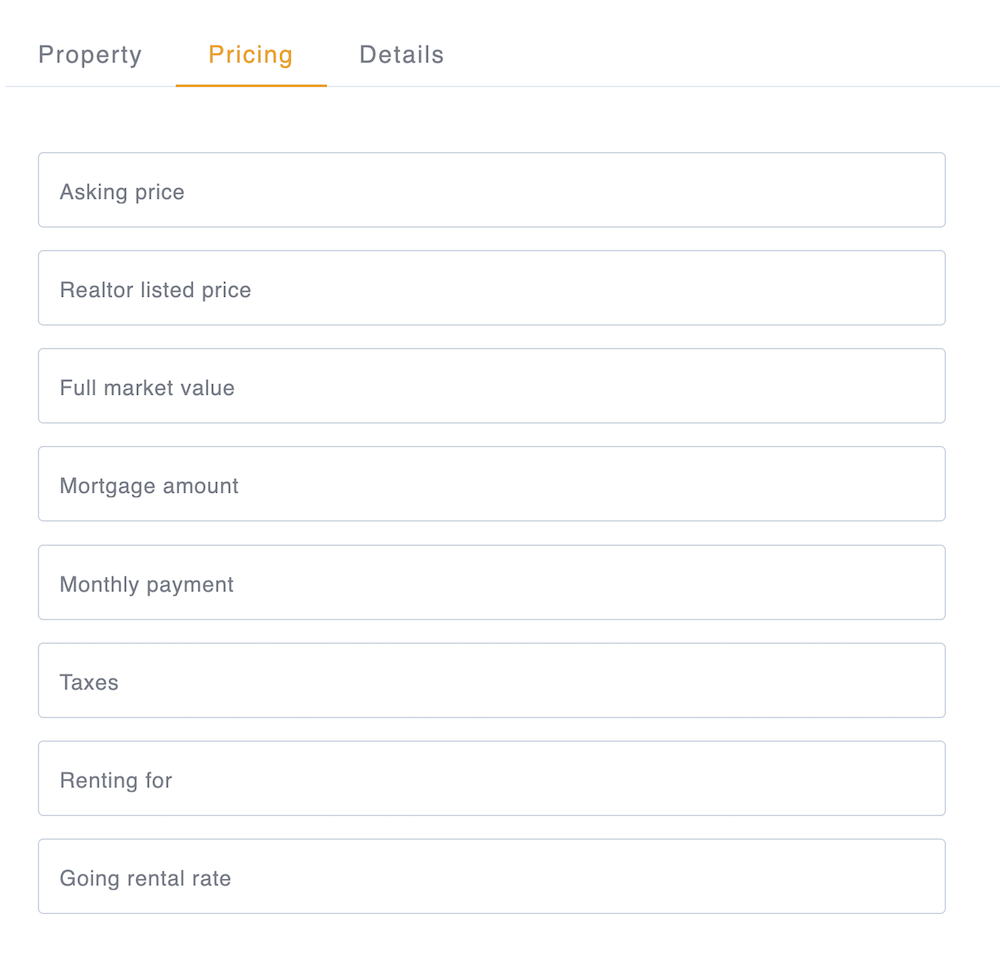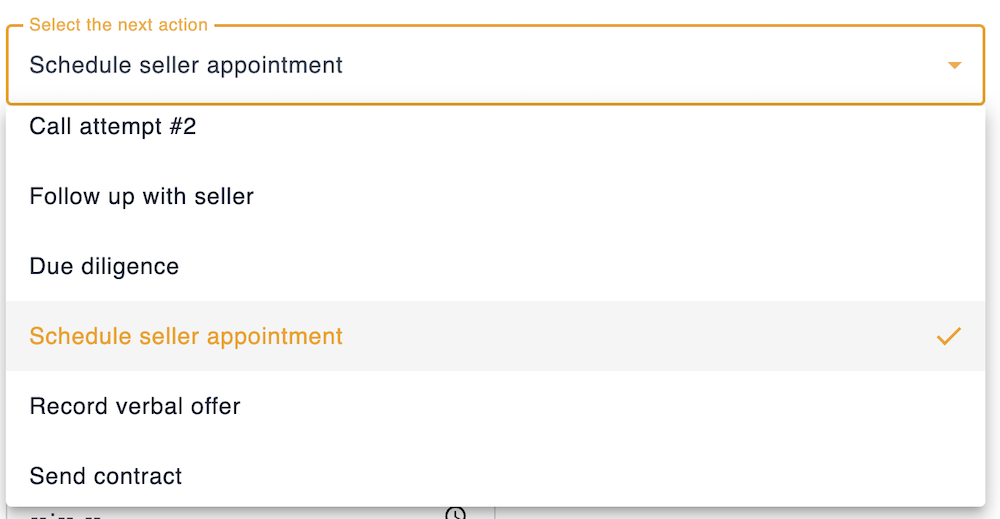If you’re a real estate investor, having a CRM designed for your needs is important. Generic CRMs don’t have the fields you need for details like property address, condition, asking pricing, etc., features like built-in maps and Zillow integrations, or follow-up tasks designed for real estate deal pipelines.
So if not all CRMs are a good fit for real estate lead management, what should you look for … and what should you avoid? This post goes over six key things to avoid when shopping for a real estate CRM.
Key Takeaways
- Real estate investors should choose a CRM designed for real estate. Generic CRMs don’t have the fields or features needed for real estate lead and pipeline management.
- Choose a real estate CRM that has the features you need and will grow with your business, but don’t get distracted by too many unrelated features.
- When choosing a real estate CRM, make a list of your desired features, ask for recommendations in a way that gives you usable insights, and get live demos from the CRM providers you’re considering.
Table of Contents
- What is a real estate CRM?
- 1. It’s not designed for real estate
- 2. It’s difficult to set up or use
- 3. It doesn’t have AI features
- 4. It doesn’t support integrations
- 5. It has TOO many features
- 6. It can’t grow with you
- How to find the right real estate CRM
What is a real estate CRM?
CRM stands for Customer Relationship Management, and “a CRM” is software that helps you manage those relationships. CRMs provide a centralized place to store lead details, communication records, and activities, as well as set follow-up tasks and often include built-in options for communicating with leads via email, text message, or even calls. The goal is to help you actively keep track of leads and move them down the pipeline to a closed deal. Salesforce and HubSpot are some of the more well-known CRMs on the market, but they’re not designed for real estate professionals.
A real estate CRM is CRM software built specifically for real estate professionals, particularly investors, agents, and property managers. Popular real estate investing CRMs include CarrotCRM, InvestorFuse, Resimpli, and Left Main REI. These solutions offer information fields and features unique to real estate lead management, such as built-in property data, nearby real estate comps, and follow-up steps like “due diligence” that you won’t find in a generic CRM.
When shopping for a CRM as a real estate investor, here are some key things to avoid to ensure you get a CRM that works well for your business.
1. It’s not designed for real estate
Handling a lead interested in selling their house to a wholesaler is very different than managing leads interested in buying enterprise software. Most CRMs have built-in fields for things like job title, company size, revenue, and buying roles — all fields that don’t make sense for real estate investors dealing with individuals.
While you can customize most CRMs with custom fields, why spend the extra time trying to make something work when it’s not a good fit? Especially since there are CRMs designed out of the box for real estate investors.
A real estate specific CRM has built-in data fields that make more sense for your use case. Fields like:
- Property details
- Estimated repairs needed
- Outstanding mortgage information
- Reason for selling
- Time to sell
- Occupancy details
Think of all the information you (or your lead or acquisition managers) would gather when assessing an opportunity. That information needs a dedicated place to live. Choose a CRM that is already built for that information instead of spending time setting it up manually.

Some real estate CRMs (like CarrotCRM) even pull much of this information into the opportunity for you via Zillow integrations and additional property data reports. This saves you time and gives you a better understanding of the property and potential deal value.
2. It’s difficult to set up or use
Speaking of not spending too much time setting up your CRM, that piece of advice also goes for dedicated real estate CRMs. Some are more complicated than others, and if it’s difficult to set up or use, you likely won’t end up using it.
Choose a CRM that has onboarding assistance, and be mindful of the timeline for launch. Some highly customizable CRMs like Left Main REI and HighLevel require a large amount of expertise and time to implement (which also drives up the price).
Don’t forget to look beyond implementation and consider what the day-to-day usage looks like. For instance, if the CRM relies on complicated workflows for lead nurturing, it could be overwhelming to set-up, use, and get value out of. Trust me, as a professional marketer for more than 15 years, I’ve spent plenty of time setting up automated workflows. It’s not a simple task, and it’s distributingly easy to mess up … meaning the workflow isn’t doing what you think it’s doing. Understanding automation can be full time job. Since marketing isn’t your full time job, look for a CRM with easy-to-use automations.
Consider choosing an action-based CRM that drives activities to make sure deals keep moving. If your CRM is little more than an online to-do list, it’s not any more effective than keeping track of your leads and tasks manually. An action-based CRM helps you set the right follow-up tasks and makes sure you know what to do next, keeping you on track.

For example, CarrotCRM’s action-based system does not allow you to complete an existing task without setting up the next follow-up step. This ensures you never forget what needs to be done or when the deadline is. Every CRM says it helps “keep leads from slipping through the cracks,” but if you forget to set the next follow-up step (or think you’ll do it later), that’s exactly what happens. CarrotCRM prevents that by making sure every lead always has a next step, owner, and due date. Then, these tasks get pulled into your My Dashboard view, ensuring nothing is forgotten
3. It doesn’t have AI features
Smart real estate investors use new AI tools to do more work in less time. Those who aren’t will to be increasingly left behind. With that in mind, don’t invest in a CRM that doesn’t have built-in AI.

Depending on your need and the CRM, AI can do everything from having information gathering conversations with leads, to making sure you’re aware if circumstances change and a lead becomes more or less likely to close, to nurturing cold leads. These tools save investors countless hours and help them focus their time and efforts on the most promising leads. Investors who continue to do everything manually will see themselves closing fewer deals in the months and years to come.
Many CRMs are adding new AI features fairly often, so ask about features on the company’s roadmap when evaluating your options. If they’re not adding AI features at all, they’re likely to become outdated in the near future. (Be sure you understand the pricing model for any AI features. Some may be included in the base price, but many CRMs treat AI as an add-on with its own price.)
If the CRM doesn’t have a specific AI capability you’re interested in, make sure it supports integrations that allow you to add that feature. Which brings us to our next thing to avoid …
4. It doesn’t support integrations
CRMs can be very feature-rich (sometimes too feature-rich, but more on that in a second), but if it’s a completely closed system that doesn’t allow integrations, you’ll find yourself trapped. Whether you’re integrating a lead source or connecting another tool, your CRM needs to be the hub for your lead management. It can’t be a hub if you can’t connect the data and tools that you need and use.
Allowing integrations lets you use best-in-class solutions that fit your specific needs and preferences. You may want to integrate a tool that the CRM doesn’t have built in or use an alternative that you like better than the included capability. Using your preferred phone system is a great example. You should be allowed to use the tools and software you want, not what the CRM dictates.
This is particularly helpful with AI tools. There’s not a single real estate CRM that offers every common AI capability. AI is too new, and companies are still building out their AI feature suites, focusing first on the capabilities they think are most valuable to their users. Even as CRMs add new AI features, there are some AI tools that dedicated companies will likely be better at. AI voice solutions are the perfect example. It takes a lot to make an artificial voice agent sound real and engaging. Companies that focus only on AI voice are likely to perfect it before a CRM company creating its own in-house version.
That’s another thing to avoid — CRMs that do too much.
5. It has TOO many features
This may sound silly, but hear me out — more features are not always better. All-in-one CRMs promise to let you handle marketing, lead generation, lead follow-up, and deal management all in one platform. That sounds enticing until you start looking more closely.
All-in-one solutions have many potential pitfalls, but the main things to ask yourself are:
- Am I paying for features I don’t want or use?
- It does a lot of things, but does it do them all well?
Best-in-Class versus All-in-Ones
Define what you want to accomplish with a CRM and your overall goals, then look into the features that will help you get there. If your goal is to close more deals, do you really need more leads (i.e. outbound marketing tools) or do you need to better handle the leads you have (i.e. a CRM that hyper focuses on working your lead database)? All the bells and whistles are attractive, but they can also distract you from the main task at hand or leave you with substandard features because a company is stretched too thin.
6. It can’t grow with you
While you don’t want a CRM that’s so feature-rich that it’s distracting, you do want to choose a CRM that has the right features to scale with your business.
Focus on lead management related features like campaign tracking, employee dashboards, and round robin lead distribution. These are in line with the main purpose of a CRM and help you effectively assign, track, and manage leads as your lead sources (marketing campaigns) and acquisition management team grow.
Don’t forget to look at the CRM’s pricing model. While it may be affordable now, it might not always be that way. Does it grow in a sensible way, or does the price make crazy jumps if you need to add more users, contact records, or AI usage? Or worse, is the pricing behind a “Contact Sales” gate, meaning you have no idea what will happen to the cost as you grow?
One of the worst things is having to switch your CRM. Moving to a new system takes a lot of time, effort, and learning, interrupting more important work. It’s better to find a CRM that is affordable and meets your needs when you’re just starting out, but that can grow with you as your business scales.
How to find the right real estate CRM
We’ve talked a lot about what to avoid when choosing a real estate investing CRM, but I don’t want this post to be disheartening! There are amazing CRMs for real estate investors available. Here are some tips on how to find the best one for you.
Make a list of the features you need and rank each one by importance
Just like with any important purchase, make a list of your must-have and nice-to-have features, then rank those in order of importance. Define your goals and work backwards to ensure you’re not distracted.
This gives you a rubric to evaluate potential CRM providers. There may not be a perfect fit, but focusing on your must-have list will ensure your new CRM meets your main requirements.
Download our Software Evaluation Matrix
Be smart about how you ask for recommendations
It’s natural to ask for recommendations from people you trust, especially with so many coaches in the real estate investing industry. Everyone has an opinion. The trick is to understand what you’re looking for and how well their recommendation aligns with your needs.
When asking about real estate CRMs, here are a few key questions to get a real understanding of its fit and functionality:
- What were you looking for in a CRM? (Make sure it aligns with what you want to accomplish. It may be a great CRM from the person you’re talking to, but not the right fit for you.)
- What features do you use all the time? What are your favorites?
- Is there something you thought you’d like, but actually never use?
- What don’t you like about it?
- Is there anything you feel it’s missing?
- What made you choose this CRM? Did you consider any others?
Pro tip: Avoid yes or no questions. These don’t give you the level of insight you need to make your own decision.
Get a live demo
Even the most user-friendly CRMs can seem overwhelming at the start. Before committing, book a live demo to see it in action and ask questions.
Watching video reviews is a good start, but they aren’t interactive. Speaking to a professional who knows the software gives you a better understanding of how you’ll use it and the chance to ask clarifying questions or get a deeper demonstration of certain features.
Armed with this list of things to avoid and a few steps to finding the right solution for you, you’ll have the perfect real estate CRM in no time!

